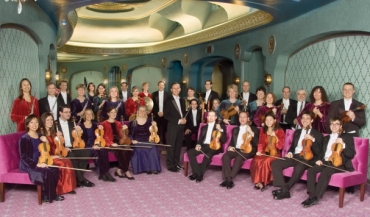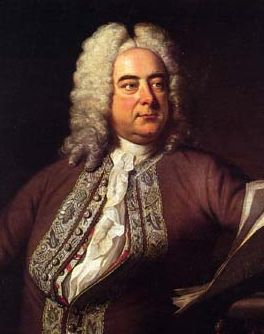The Well-Tempered Ear
Classical music: The Ear learns some lessons from violinist Ilya Kaler and the Wisconsin Chamber Orchestra at a terrific opening concert
Leave a Comment
By Jacob Stockinger
By any measure the opening concert last Friday night of the Wisconsin Chamber Orchestra (below) under music director Andrew Sewell was a complete and compelling success.
It left The Ear with several big lessons:
- The same piece played by a chamber orchestra and a symphony orchestra is not the same piece.
The Ear remembers hearing one of the first Compact Discs commercially available: a recording of the famous “Eroica” Symphony by Ludwig van Beethoven performed by the popular chamber orchestra, the Academy of St. Martin in the Fields under its recently deceased founder and longtime conductor Sir Neville Marriner.
Was it going to be Beethoven Lite after all the versions from the New York Philharmonic under Leonard Bernstein and the Berlin Philharmonic under Herbert von Karajan?
Not at all.
It turned out that symphony orchestras are about power while chamber orchestras are about subtlety. The same work sounds very different when performed by the two different kinds of ensembles.
So it was with the Violin Concerto by Peter Tchaikovsky with Russian prize-winning soloist Ilya Kaler and conductor Andrew Sewell. The WCO players performed beautifully, and with the chamber orchestra you felt a balance and an intimacy between the soloist, the orchestra and conductor Sewell (below).
You could hear with more clarity or transparency the structure of the concerto and the dialogue of the violin with various orchestral sections – the flutes and clarinet stood out – that often get drowned out by bigger accompanying forces.
So when you see the same work programmed by the Madison Symphony Orchestra and the Wisconsin Chamber Orchestra, do not think of them as duplications you have to choose between. Go hear both. Listen for the differences. You will not be disappointed.
That’s what The Ear did and he came away enthralled and enchanted with this smaller-scale Tchaikovsky.
- There are many great and more affordable soloists whose names we do not recognize. But don’t underestimate them just because you haven’t heard of them.
The world has more first-rate musical talent than ever. Ilya Kaler (below), the only violinist ever to win gold medals at the Tchaikovsky, Paganini and Sibelius competitions, is a case in point. We owe a big thanks to the WCO for finding and booking him. He is right up there with the American violinist Benjamin Beilman, whom the WCO booked last season.
Kaler’s playing was first-rate and world-class: virtuosic, both lyrical and dramatic, but also nuanced. His tone was beautiful and his volume impressive – and all this was done on a contemporary American violin made in Ann Arbor, Michigan. (You can hear Kaler play in the YouTube video at the bottom.)
The Ear says: Bring Kaler back – the sooner, the better. The Ear wants to hear him in violin concertos by Johann Sebastian Bach, Georg Philipp Telemann, Antonio Vivaldi and other Italian Baroque masters like Francesco Geminiani and Arcangelo Corelli. Classical-era concertos by Wolfgang Amadeus Mozart would be wonderful. More Romantic concertos by Ludwig van Beethoven, Felix Mendelssohn, Nicolo Paganini, Johannes Brahms and Robert Schumann would also be great. And how about the Violin Concerto No. 2 by Sergei Prokofiev and the neo-Classical Violin Concerto by Igor Stravinsky?
But anything will do. Kaler is a violinist – he records for the Naxos label — we should hear more often. These days, we need fewer big stars and more fine talent that makes attendance affordable. The Ear will take young and talented cellists Alisa Weilerstein and Joshua Roman over such an overpriced celebrity as Yo-Yo Ma, great as he is.
- Second-tier composers can teach you about great composers.
The WCO opened with a rarely heard eight-minute work, the Symphony No. 5 in D Major, by Baroque English composer William Boyce (below top). It was enjoyable and The Ear is happy he heard it.
True, it comes off as second-rate Handel (below bottom). Why? Because as composer John Harbison explained so succinctly at the Token Creek Chamber Music Festival he co-directs here every summer, the music by George Frideric Handel has a hard-to-explain “heft.” Just a few notes by Handel make memorable music that somehow sticks in your memory.
So The Ear heard the pleasantness of Boyce and ended up appreciating even more the greatness of Handel. What a two-fer!
- Concerts should end on a high note, even if they also start on a high note.
The rarely played Symphony No. 4 “Tragic” by Franz Schubert received an outstanding reading. But it ended the concert and left the audience sitting in its seats.
The Tchaikovsky Violin Concerto, by contrast, got an immediate standing ovation and an encore – a wonderful rendition of an unaccompanied Gavotte by Johann Sebastian Bach — and they ended the first half triumphantly.
Maybe the Schubert and Tchaikovsky should have been reversed in order. Or else, what about programming a really energetic symphony by Mozart or Beethoven to end the concert on an upbeat note. Just a thought.
If you went to the season-opener by the Wisconsin Chamber Orchestra, what thoughts and impressions did you have?
Do you agree or disagree with The Ear?
The Ear wants to hear.
Tags: Alisa Weilerstein, Antonio Vivaldi, Arcangelo Corelli, Artistic director, Arts, Bach, Baroque, Beethoven, Boyce, Chamber music, Classical music, Compact Disc, concerto, Franz Schubert, Gavotte, Geminiani, Georg Philipp Telemann, George Frideric Handel, Igor Stravinsky, Jacob Stockinger, Johann Sebastian Bach, Johannes Brahms, John Harbison, Joshua Roman, Ludwig van Beethoven, Madison, Madison Symphony Orchestra, Mendelssohn, Mozart, Music, Niccolo Paganini, Orchestra, Sergei Prokofiev, solo, symphony, unaccompanied, United States, University of Wisconsin-Madison School of Music, University of Wisconsin–Madison, Violin, Violin concerto, Wisconsin, Wisconsin Chamber Orchestra, Yo-Yo Ma, YouTube
- May 2024
- April 2024
- March 2024
- February 2024
- January 2024
- December 2023
- November 2023
- October 2023
- September 2023
- August 2023
- July 2023
- June 2023
- May 2023
- April 2023
- March 2023
- February 2023
- January 2023
- December 2022
- October 2022
- September 2022
- June 2022
- May 2022
- April 2022
- March 2022
- July 2021
- June 2021
- May 2021
- April 2021
- March 2021
- February 2021
- January 2021
- December 2020
- November 2020
- October 2020
- September 2020
- August 2020
- July 2020
- June 2020
- May 2020
- April 2020
- March 2020
- February 2020
- January 2020
- December 2019
- November 2019
- October 2019
- September 2019
- August 2019
- July 2019
- June 2019
- May 2019
- April 2019
- March 2019
- February 2019
- January 2019
- December 2018
- November 2018
- October 2018
- September 2018
- August 2018
- July 2018
- June 2018
- May 2018
- April 2018
- March 2018
- February 2018
- January 2018
- December 2017
- November 2017
- October 2017
- September 2017
- August 2017
- July 2017
- June 2017
- May 2017
- April 2017
- March 2017
- February 2017
- January 2017
- December 2016
- November 2016
- October 2016
- September 2016
- August 2016
- July 2016
- June 2016
- May 2016
- April 2016
- March 2016
- February 2016
- January 2016
- December 2015
- November 2015
- October 2015
- September 2015
- August 2015
- July 2015
- June 2015
- May 2015
- April 2015
- March 2015
- February 2015
- January 2015
- December 2014
- November 2014
- October 2014
- September 2014
- August 2014
- July 2014
- June 2014
- May 2014
- April 2014
- March 2014
- February 2014
- January 2014
- December 2013
- November 2013
- October 2013
- September 2013
- August 2013
- July 2013
- June 2013
- May 2013
- April 2013
- March 2013
- February 2013
- January 2013
- December 2012
- November 2012
- October 2012
- September 2012
- August 2012
- July 2012
- June 2012
- May 2012
- April 2012
- March 2012
- February 2012
- January 2012
- December 2011
- November 2011
- October 2011
- September 2011
- August 2011
- July 2011
- June 2011
- May 2011
- April 2011
- March 2011
- February 2011
- January 2011
- December 2010
- November 2010
- October 2010
- September 2010
- August 2010
- July 2010
- June 2010
- May 2010
- April 2010
- March 2010
- February 2010
- January 2010
- December 2009
- November 2009
- October 2009
- September 2009
- August 2009
Archives
- 2,491,465 hits
Blog Stats
Recent Comments
| Brian Jefferies on Classical music: A major reass… | |
| welltemperedear on What made Beethoven sick and… | |
| rlhess5d5b7e5dff on What made Beethoven sick and… | |
| welltemperedear on Beethoven’s Ninth turns 200… | |
| Robert Graebner on Beethoven’s Ninth turns 200… |
Tags
#BlogPost #BlogPosting #ChamberMusic #FacebookPost #FacebookPosting #MeadWitterSchoolofMusic #TheEar #UniversityofWisconsin-Madison #YouTubevideo Arts audience Bach Baroque Beethoven blog Cello Chamber music choral music Classical music Compact Disc composer Concert concerto conductor Early music Facebook forward Franz Schubert George Frideric Handel Jacob Stockinger Johannes Brahms Johann Sebastian Bach John DeMain like link Ludwig van Beethoven Madison Madison Opera Madison Symphony Orchestra Mead Witter School of Music Mozart Music New Music New York City NPR opera Orchestra Overture Center performer Pianist Piano post posting program share singer Sonata song soprano String quartet Student symphony tag The Ear United States University of Wisconsin-Madison School of Music University of Wisconsin–Madison Viola Violin vocal music Wisconsin Wisconsin Chamber Orchestra wisconsin public radio Wolfgang Amadeus Mozart YouTube



